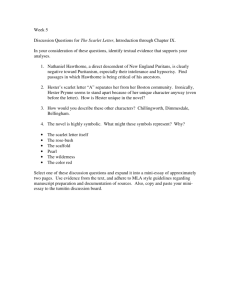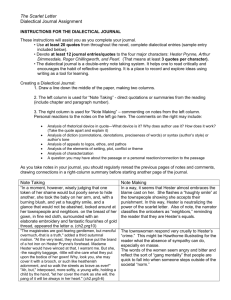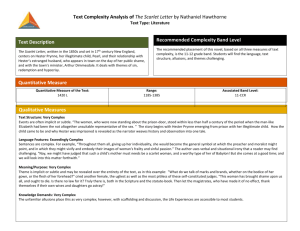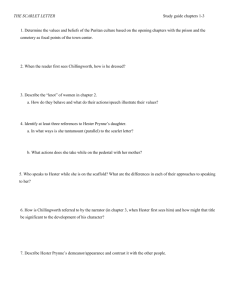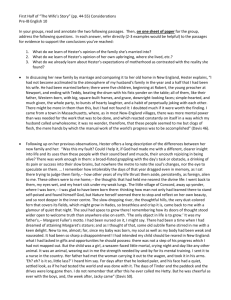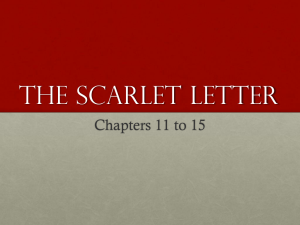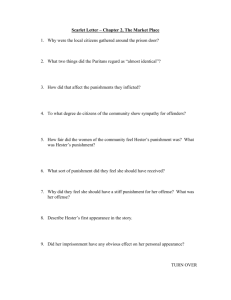The Scarlet Letter Dialectical Journals
advertisement
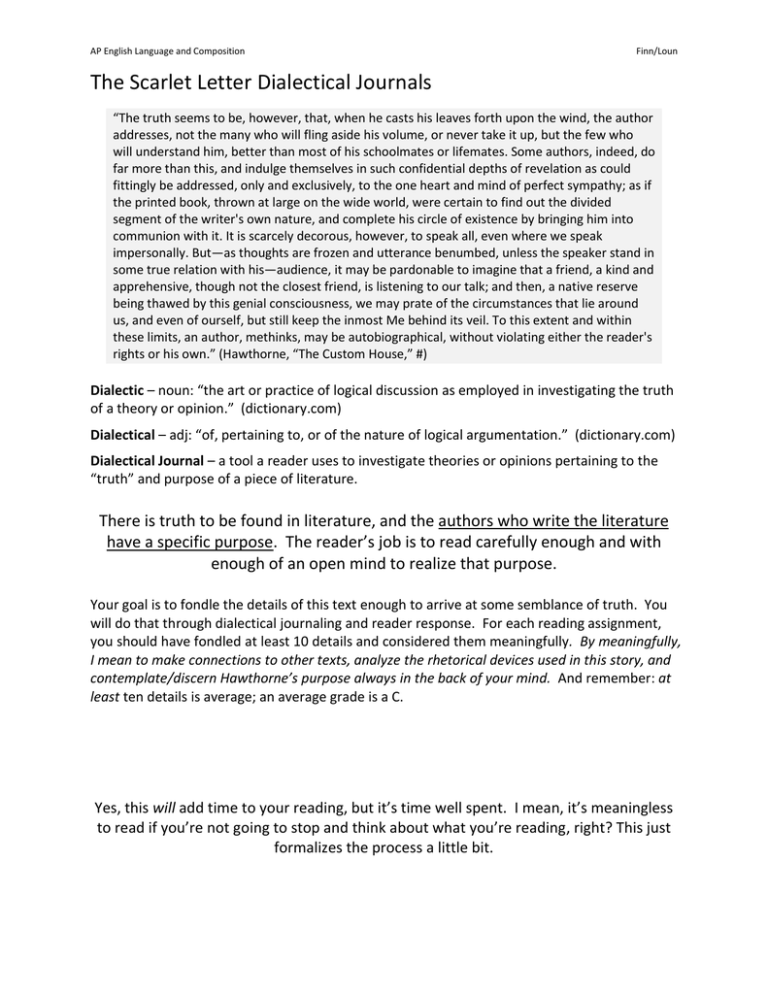
AP English Language and Composition Finn/Loun The Scarlet Letter Dialectical Journals “The truth seems to be, however, that, when he casts his leaves forth upon the wind, the author addresses, not the many who will fling aside his volume, or never take it up, but the few who will understand him, better than most of his schoolmates or lifemates. Some authors, indeed, do far more than this, and indulge themselves in such confidential depths of revelation as could fittingly be addressed, only and exclusively, to the one heart and mind of perfect sympathy; as if the printed book, thrown at large on the wide world, were certain to find out the divided segment of the writer's own nature, and complete his circle of existence by bringing him into communion with it. It is scarcely decorous, however, to speak all, even where we speak impersonally. But—as thoughts are frozen and utterance benumbed, unless the speaker stand in some true relation with his—audience, it may be pardonable to imagine that a friend, a kind and apprehensive, though not the closest friend, is listening to our talk; and then, a native reserve being thawed by this genial consciousness, we may prate of the circumstances that lie around us, and even of ourself, but still keep the inmost Me behind its veil. To this extent and within these limits, an author, methinks, may be autobiographical, without violating either the reader's rights or his own.” (Hawthorne, “The Custom House,” #) Dialectic – noun: “the art or practice of logical discussion as employed in investigating the truth of a theory or opinion.” (dictionary.com) Dialectical – adj: “of, pertaining to, or of the nature of logical argumentation.” (dictionary.com) Dialectical Journal – a tool a reader uses to investigate theories or opinions pertaining to the “truth” and purpose of a piece of literature. There is truth to be found in literature, and the authors who write the literature have a specific purpose. The reader’s job is to read carefully enough and with enough of an open mind to realize that purpose. Your goal is to fondle the details of this text enough to arrive at some semblance of truth. You will do that through dialectical journaling and reader response. For each reading assignment, you should have fondled at least 10 details and considered them meaningfully. By meaningfully, I mean to make connections to other texts, analyze the rhetorical devices used in this story, and contemplate/discern Hawthorne’s purpose always in the back of your mind. And remember: at least ten details is average; an average grade is a C. Yes, this will add time to your reading, but it’s time well spent. I mean, it’s meaningless to read if you’re not going to stop and think about what you’re reading, right? This just formalizes the process a little bit. AP English Language and Composition Finn/Loun Sample Dialectical Journal Passage of Text “Some authors, indeed, do far more than this, and indulge themselves in such confidential depths of revelation as could fittingly be addressed, only and exclusively, to the one heart and mind of perfect sympathy; as if the printed book, thrown at large on the wide world, were certain to find out the divided segment of the writer's own nature, and complete his circle of existence by bringing him into communion with it. It is scarcely decorous, however, to speak all, even where we speak impersonally” (15). “At all events, I, the present writer, as their representative, hereby take shame upon myself for their sakes, and pray that any curse incurred by them – as I have heard and as the dreary and unprosperous condition of the race, for many a long year back, would argue to exist – may be now henceforth removed” (21). “’A wise sentence!’ remarked the stranger, gravely bowing his head. ‘Thus she will be a living sermon against sin, until the ignominious letter be engraved upon her tombstone. It irks me, nevertheless, that the partner of her iniquity should not, at least, stand on the scaffold by her side. But he will be known! – he will be known! – he will be known!’” (69). Response and Consideration This reminds me of Richard Rodriguez – he reveals so much about himself and his family that he hurts his mother. I’m not sure any story is worth that, even though I have learned so much from him. Perhaps Hawthorne has a personal connection to the story of the Scarlet Letter and that’s why he mentions this. Is it an apology in advance for the personal nature of what he’s about to tell? Or perhaps it foreshadows some event: “it is scarcely decorous, however, to speak all, even where we speak impersonally.” On the scaffold, Hester refuses to speak of the man who got her pregnant. Maybe she feels it would be “scarcely decorous” of her, even if it would lighten her punishment. It seems that Hawthorne is taking responsibility for the crimes of his ancestors. I wonder if that means that he forgives them what they did to the women in the witch trials, or to those that were pushed into the margins like Hester. Perhaps there is a hint at purpose here; maybe this book is cathartic for him, an exploration of the crimes of his forefathers and a plea to forgive them their faults. Woah. Someone’s angry. And isn’t this a bit much for her crime? What kind of world does Hester live in that would treat her like this, and who is this man who would exclaim three times in a row that he wants to know the man who fathered Hester’s child? Clearly this is important, I just don’t really know why yet. What I do know is that this punishment is unfair. Hester is not the only one who sinned. (An alternate response from Ms. Krebs: “Clearly the other person should also be punished, but should Hester’s punishment be lessened because the other culprit could not be found? I don’t think so.”)
